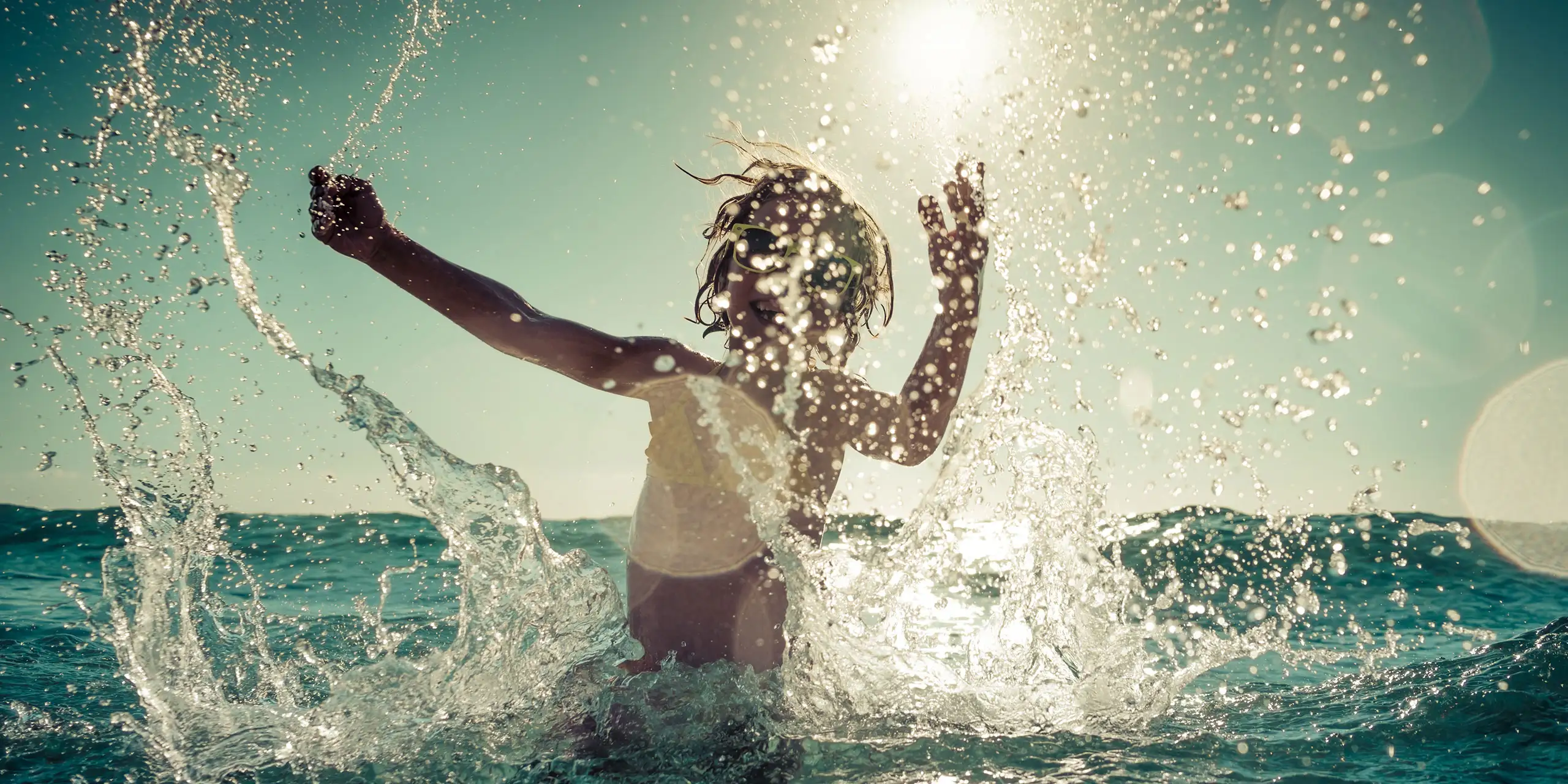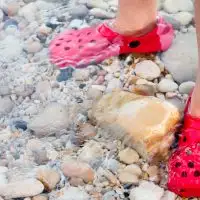Perched on the edge of the scuba diving boat about half an hour off the Bermuda shore, I wobbled in my floppy fins, struggling to keep my balance with about 60 pounds of underwater equipment strapped to my back. I was also determined to keep down my breakfast.
“Go ahead! Just step in!” yelled the instructor. My tween son had already joined the group in the water. Everyone watched, waiting for me to take the plunge. I told myself that my son and I would share this incredible memory of discovering a new sport together. If only I could remember to breathe.
So I jumped into the ocean, suddenly realizing there is one thing you should never do on vacation: Give in to your fears.
Our family travels a lot, and I have become a (very) reluctant thrill-seeker, because my son and husband are adrenaline junkies. I’m usually vibrating with nervousness as I follow their adventurous instincts, and I’m not alone. Anxiety affects about 40 million adults in the U.S., and lots of triggers involve traveling, says Dr. Graham Reynolds, a senior psychologist at the American Institute for Cognitive Therapy in New York.
“As many as one in four people experience discomfort with flying, and other fears like driving over bridges or claustrophobia – while scuba diving, snorkeling, or even on the plane itself – can also deter people from travel,” he explains.
Want an awesome family vacation? Experts suggest pushing past your worry, whether it’s your kids’ reluctance to try new food or sleep in a strange bed, your clashes with claustrophobia or your mother-in-law’s dread of rides that spin upside down.
Expect some apprehension… but be prepared to conquer it.
“Fear is a good thing. We have fear because it keeps us alive, and certain fears parents might have around travel – like how safe is this location or are there any health concerns – are perfectly reasonable,” says Dr. Debra Kissen, executive director of Light on Anxiety Treatment Center in Chicago, and co-chair of the Public Education Committee of the Anxiety/Depression Association of America (ADAA).
“However, it’s really uncomfortable to face your fears. In that moment, your body is sending you a million different signals to either flee or freeze. To push forward is very, very hard, so it’s important to look at your values: If you want your life to be about family and learning new experiences, getting on that plane with your kids to see another part of the world is worth it for you.”
Push forward.
Sometimes when we try to calm ourselves down once anxiety has taken over, we feel even worse, notes Dr. Kissen.
“It’s helpful to realize that, yes, you’re going to have all these uncomfortable feelings like your body is revving up to fight real danger, but it’s not dangerous to push forward anyway,” she explains. “You might feel anxiety right before you’re about to go ziplining, but you can handle those feelings. It’s really just adrenaline moving through your body. Try thinking of it as excitement.”
Never mind taking deep cleansing breaths, because that won’t help, adds Dr. Kissen. Instead, do something physical to release some of that adrenaline, such as marching in place, hopping on one foot or doing a jumping jack.
Your kids are watching what you do, all the time.
Dr. Kissen says she practices taking herself out of her comfort zone to help her three children learn to challenge themselves. Parents are always modelling – even on family vacations – so if they see you pushing through your fear to do something new, they’ll take notice.
“Sometimes parents hide their fears because they don’t want to make their kids more afraid, but it’s actually very healthy to say, wow, I’m really scared, and this is what I’m going to do to try to handle it,” says Dr. Kissen. “It gives kids permission to have a range of emotions, and that’s a very really good learning moment.”
Sometimes less (information) is more.
While it’s a good idea to involve children in choosing activities to do during vacation, you might want to keep some things under wraps if anyone in your family feels anxious while traveling, suggests Dr. Kissen.
“I’m a big fan of just doing it, because anxiety has a way of being insatiable: The more information given, the more questions you’ll get,” she explains. “For example, if you’re going on a Segway tour, your child might ask if there are going to be big hills. The thinking part of the brain wants certainty and that’s impossible.”
Mealtime misery can be solved.
We’re lucky that our son has always wanted to try new foods on vacation – the more exotic, the better. But for kids, that will only eat chicken nuggets or plain noodles, try using positive reinforcement, suggests Dr. Reynolds.
“Children respond very well to praise from their parents,” says Dr. Reynolds, who recommends telling kids that they don’t have to finish a dish, but should at least try it.
“If you want your child to try a new food or do something outside their comfort zone, let them know that they’ll get a reward afterwards, like ice cream or extra screen time.”
Dr. Kissen suggests packing along familiar snacks from home that you can give them after they’ve eaten something new.
Guess what? You don’t have to face every single fear.
It’s also perfectly fine for you or your children to decide not to try something.
“It’s important for kids to realize that some things feel really, really hard and it’s not all or nothing,” explains Dr. Kissen.
“If you’re afraid of heights, maybe it’s impossible to be on top of Mount Everest, but you can go to the top of Sears Tower. It’s okay to tell your kids that you’re still terrified of big roller coasters, but this smaller roller coaster is something you’ll push yourself to do. You don’t have to do everything that scares you.”
But sometimes, a little push becomes a fantastic experience.
Repeated exposure to things that make us feel anxious is far better for us in the long run than refusing to do them, says Dr. Reynolds.
“Avoidance can feel better in the moment, but this becomes a pattern where we can feel paralyzed when faced with challenging situations,” he explains.
When Dr. Kissen’s family visited Hollywood Studios at Disney World, her middle son was looking forward to riding the Rock ‘n Rollercoaster, until he realized it went upside down.
“I hadn’t mentioned that to him because I knew it would freak him out, and he refused to get on,” she recalls. “But I also knew he would regret it and be so disappointed in himself if he didn’t go, so I grabbed him and said, ‘We’re doing this.’ The second we got on, he was so happy and proud of himself.”
Planning ahead can save a ton of trepidation during your trip.
Thinking of touring some caves in the Caribbean, or exploring the floor of the ocean in a submarine? A little advance work to learn some coping tactics can quell nervous emotions, says Dr. Reynolds..
“If the anxiety is severe, it’s important to address these things before going on vacation,” he suggests.
“There are effective, evidence-based treatments that can help people overcome anxiety in as little at 10 to 12 weeks. With Cognitive Behavioral Therapy (CBT), there’s an emphasis on changing how you think and how you react to thoughts in order to reduce your level of distress. Managing your own worry can help enrich your experience of travel, and it will help you model the behavior that coping with anxiety is something that can be done.”
Some CBT exercises include relaxation skills like breathing and meditation, helpful imagery and focusing on the present moment. If you’re afraid to fly, download funny movies on a tablet to take your mind off your worry.
“For things like scuba diving, roller coasters or ziplining, staying in the moment with the sights, sounds, and physical sensations can be incredibly powerful,” he says. “I’m not a huge fan of heights, but I love testing myself. On a recent trip to Costa Rica, my wife and I went ziplining and we were asked to hang upside down with our hands off the harness. I didn’t feel comfortable, so I rode the line in the typical fashion and was still able to enjoy the experience without getting down on myself.”
Dr. Reynolds encourages people with anxiety to willingly experience discomfort because it’s usually worth it.
“Reminding yourself that you can tolerate the discomfort because of the rewards you get from traveling can enrich your experience,” he says. “Parents can show children that it’s okay to feel nervous while still trying important things.”
Our team of parents and travel experts chooses each product and service we recommend. Anything you purchase through links on our site may earn us a commission.







